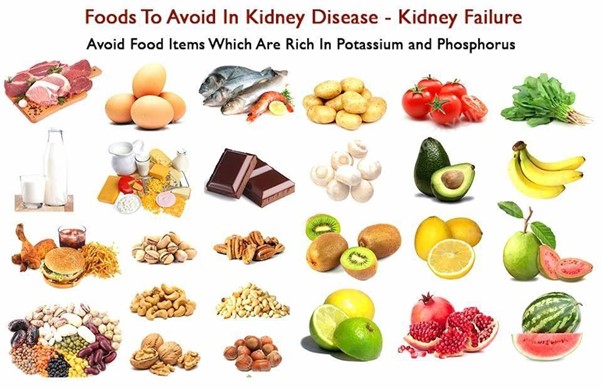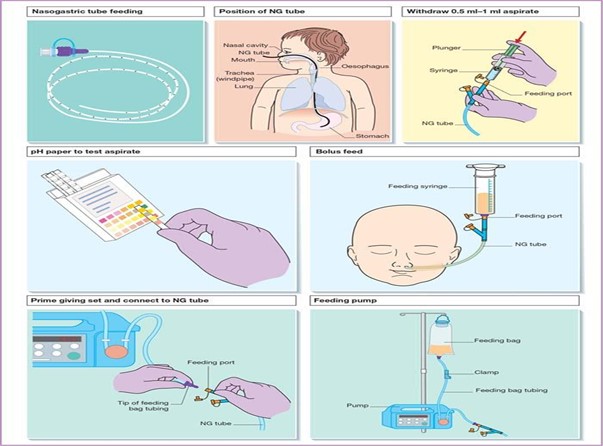The nurse is caring for a client admitted with chronic kidney disease advancing to stage 4. The nurse should instruct the client to limit the ingestion of which type of foods?
Apples and blueberries.
Avocados and bananas.
Cherries and cranberries.
Carrots and green beans.
The Correct Answer is B
Choice A
Apples and blueberries are incorrect. While apples and blueberries are sources of nutrients, they are not as high in potassium as avocados and bananas.
Choice B
Avocados and bananas are correct. Chronic kidney disease (CKD) often requires dietary modifications to manage electrolyte and mineral imbalances. In CKD stage 4, the kidney's ability to filter waste and excess substances from the blood is significantly impaired. Therefore, certain foods that are high in potassium should be limited to prevent hyperkalaemia (elevated blood potassium levels).
Choice C
Cherries and cranberries are incorrect. Cherries and cranberries are also sources of nutrients, but their potassium content is not as high as that of avocados and bananas.
Choice D
Carrots and green beans are incorrect. Carrots and green beans are vegetables that are generally lower in potassium compared to fruits like avocados and bananas.

Nursing Test Bank
Naxlex Comprehensive Predictor Exams
Related Questions
Correct Answer is B
Explanation
Choice A
Potatoes are incorrect. Potatoes are high in carbohydrates and can cause a rapid increase in blood sugar levels, so they are not the best choice for someone with diabetes trying to avoid refined sugars and carbs.
Choice B
Avocado is correct. Avocado is a good choice for someone with Type 2 diabetes who wants to avoid refined sugars and carbohydrates. Avocado is a healthy source of monounsaturated fats, fibre, and various vitamins and minerals. It has a low glycaemic index and doesn't significantly raise blood sugar levels, making it a suitable option for people with diabetes.
Choice C
Grapes is incorrect: Grapes are a fruit with natural sugars, and although they contain fibre, they can still cause spikes in blood sugar levels.
Choice D
Pretzels are incorrect. Pretzels are usually made from refined flour and are high in simple carbohydrates, causing rapid spikes in blood sugar levels. They are not a good choice for someone with diabetes aiming to avoid refined sugars and carbs.
Correct Answer is A
Explanation
Choice A
Demonstrating correct measurement of the tube insertion length is the first priority. Inserting a nasogastric tube to the appropriate length is crucial for ensuring that the tube reaches the stomach and is not inserted too far. Incorrect insertion length can lead to complications, discomfort, or potential harm to the patient. Therefore, demonstrating and ensuring the correct measurement of the tube insertion length takes priority.:
Choice B
Reminding the nurse to apply lubricant to the tube before insertion is not first priority. Applying lubricant helps ease the insertion process, but it is not the most critical step to prioritize initially.
Choice C
Confirming that the nurse has auscultated the client's bowel sounds is not the first priority. Bowel sounds assessment is important to ensure proper placement, but this step can be done after ensuring the correct measurement of the insertion length.
Choice D
Elevating the head of the bed before the nurse inserts the tube is not the first priority: Elevating the head of the bed helps facilitate the passage of the tube into the stomach, but it is not the first priority in this context.

Whether you are a student looking to ace your exams or a practicing nurse seeking to enhance your expertise , our nursing education contents will empower you with the confidence and competence to make a difference in the lives of patients and become a respected leader in the healthcare field.
Visit Naxlex, invest in your future and unlock endless possibilities with our unparalleled nursing education contents today
Report Wrong Answer on the Current Question
Do you disagree with the answer? If yes, what is your expected answer? Explain.
Kindly be descriptive with the issue you are facing.
